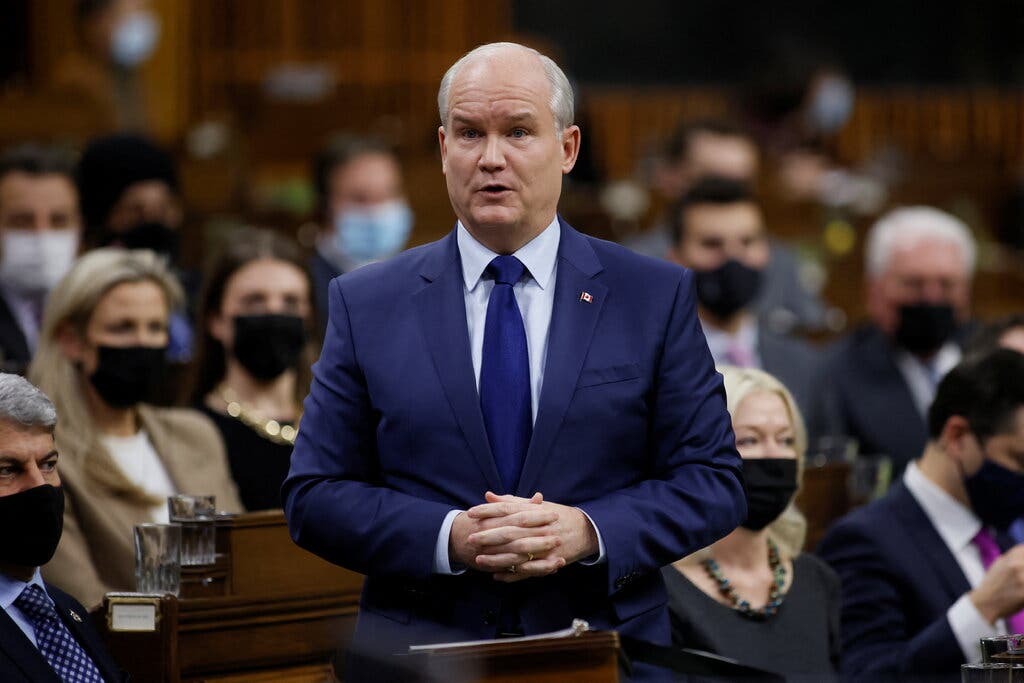Earlier this week, Erin O’Toole, the leader of Canada’s opposition Conservative Party, was defeated in a vote against his leadership, providing a political boost to Prime Minister Justin Trudeau’s minority government, which has been battered by pandemic fatigue and divided opinion over his leadership of the country.
Scott Reid, the Conservative caucus chair, said that the caucus voted against Mr. O’Toole via a secret ballot, with 73 votes against and 45 votes in favour. The vote was compelled by a petition signed by caucus members who were worried that Mr. O’Toole had strayed too far from the party’s basic conservative ideals on social matters, prompting the vote.
In a caucus meeting on Wednesday evening, Candice Bergen, the party’s deputy leader and a former cabinet minister, was picked as the party’s temporary leader. Ms. Bergen, who hails from the Prairie Province of Manitoba, will not be able to run for the position on a permanent basis at the party’s forthcoming leadership convention, according to party regulations.
Conservative members seem to have been enraged by Mr. O’Toole’s backing for a Liberal government law prohibiting conversion therapy earlier this year, prompting them to vote against him.
The decision represents something of a political gift for Mr. Trudeau, a divisive figure who has been struggling with the invasion of the Omicron type and growing irritation by pandemic restrictions since the outbreak began in 2015. Furthermore, there are economic difficulties, such as inflation of about 5 percent, which is the highest level in 30 years.
While a survey conducted on Jan. 27 by the Angus Reid Institute, a non-profit polling organisation, found that almost half of Canadians approved of Mr. Trudeau’s handling of the epidemic, his overall approval rating fell to 42 percent from 50 percent a year earlier, according to the poll.
For the third time in five years, the Conservative Party is on the lookout for a new leadership candidate. The ouster of Mr. O’Toole, 49, also suggests that the rift between the party’s more socially conservative wing, which is primarily based in Western Canada, and its fiscally conservative, socially liberal branch, which is centred in Ontario, the country’s most populous province and Mr. O’Toole’s home province, is widening even further.
Even before the vote on Mr. O’Toole’s leadership was held, some dissatisfied Conservative Party members of Parliament were already calling for his resignation, citing his failure to defeat Prime Minister Justin Trudeau’s Liberals in his first federal election as Conservative Party leader, which took place last September. In this election, the Conservative Party suffered its third straight defeat to Mr. Trudeau.
As a result of his selection as leader less than two years ago, Mr. O’Toole entered the election campaign as a bit of an unknown entity to the majority of Canadians. Using a platform that pledged to “take back Canada,” he was elected as the Conservative Party’s leader by making an appeal to the party’s conservatives on the right.
He swiftly shifted to the left after being established as leader, alienating many members of the party’s conservative wing in his effort to extend the party’s appeal. Following his defeat in the federal election last autumn, Mr. O’Toole was chastised by conservatives on the right for being a political clone of Prime Minister Justin Trudeau posing as a conservative.
He also sought to portray himself as a compassionate conservative, separating himself from the party’s social conservatism on issues such as lesbian, gay, bisexual, and transgender (L.G.B.T.Q.) rights and abortion while reaching out to union members, a group that has historically supported the left-of-center New Democratic Party.
While the Conservatives achieved a symbolic victory in the last election by capturing the largest share of the popular vote, the concentration of Conservative support in provinces such as Alberta meant that this victory did not translate into the largest number of seats in the House of Representatives. Mr. O’Toole has also come under fire when the Conservatives failed to do well in electorally key metropolitan areas such as the Toronto region and Metro Vancouver, despite his tilt to the centre of the political spectrum.
It was exposed again again this week that Mr. O’Toole and his caucus are at odds over vaccine requirements and pandemic preparedness measures after the noisy and occasionally violent demonstrations by truckers and others opposing them that have crippled downtown Ottawa over the weekend. Ms. Bergen was one of the caucus members who approved the effort, and it was only after that that Mr. O’Toole, who is in favour of immunisation, decided to join in. Contrary to other members of the caucus, however, he chose to maintain a safe distance from the demonstrations itself, meeting with representatives from the organisation only at a secret location and without any media present.
Mr. Trudeau, on the other hand, in line with the majority popular sentiment, described the protestors as a fringe organisation and criticised them for acts of violence, bigotry, and the dissemination of false information.
After a merger between the Canadian Alliance, which originated as a Western protest organisation, and the Progressive Conservative Party, which was responsible for forming Canada’s first modern federal government in 1867, the present Conservative Party was founded in 2000.
Professor Bratt said that the party of the more moderate Progressive Conservatives has been reduced to ashes in recent years.
“There were times when he was attempting to kick in and bring his party to the centre,” Mr. O’Toole said, referring to the former governor. Moreover, there were sections inside that party who did not want to proceed down that road.

